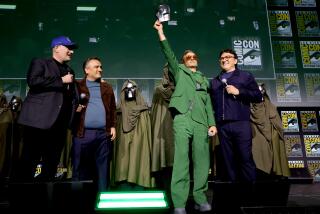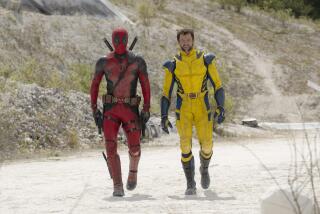Book review: Good vs. bad in ‘Marvel Comics: The Untold Story’
“Marvel Comics: The Untold Story” performs an act of what superhero comics fans might term “retcon” — or retroactive continuity — by returning to the beginning of the superhero industry and telling the tale again with a number of previously invisible heroes suddenly added to the story: the men and women who created superhero comics.
Superhero comics has always been a bit of an oddball, a niche genre with a small but fiercely devoted fan base and a penchant for stories about flawed, outcast heroes who struggle not only to save the world but find their place in it. Sean Howe’s book traces the byzantine histories of the colorful characters on the comics pages and in the Marvel offices, from the inception of the superhero in the 1930s through the modern era, and finds the real and the fictional equally laced with epic triumphs, tragic reversals of fortune, backstabbing and melodrama.
Exhaustively researched with the input of more than 150 sources, “Marvel Comics: The Untold Story” paints the publisher as perpetually torn between creative and financial impulses, between the idealistic, progressive spirit of the genre, and the corporate body where it resides.
Sometimes called the “House of Ideas,” Marvel emerges with a rather checkered past regarding its treatment of the people who came up with those ideas, including the creators of iconic characters like Spider-Man, the X-Men and the Hulk, who were denied not only royalties but sometimes even credit for their creations. Nearly every artist or writer who appears to make a significant contribution to the Marvel Universe — “the most intricate fictional narrative in the history of the world” — seems to wind up feeling alienated, exploited or discarded.
One early anecdote sums up the historical attitude of corporate comics rather succinctly. After learning that rival DC Comics planned to launch a superhero team called the Justice League of America in the early 1960s, Marvel Comics publisher Martin Goodman issued a mandate to writer Stan Lee: Steal this idea. To the credit of Lee and co-creator Jack Kirby, however, the result was not the rip-off Goodman requested but a wholly original idea — a superpowered family called the Fantastic Four.
If the powers that be come across too much like profit-seeking mustache twisters, however, Howe also drives home the financial realities of the “repeatedly endangered industry” that motivate their ethically questionable tactics. Much like the stories of superhero comics themselves, where the world is brought to the brink of apocalypse with unnerving regularity, Marvel’s fortunes have edged to the precipice again and again over the years, rising and falling as periods of booming sales and glorious mainstream media attention dissolved suddenly into brutal financial busts.
After rebounding from a 1996 bankruptcy, Marvel Comics is now enjoying the boons of one multimillion-dollar superhero movie blockbuster after another, but Howe’s glance around the modern world of print comics reveals a familiar tableau: the same painfully limited readership, the same over-reliance on marketing gimmicks, the same painful tension between art and commerce — and occasionally, some of the most sophisticated illustration and writing in the genre’s history.
Lee’s editorial advice to his writers in the early days of Marvel Comics seems more resonant than ever: superheroes should have only the “illusion of change,” forever appearing to break new ground but always returning firmly to the status quo.
Indispensable for comics fans and compelling reading for “civilians” with a casual curiosity in capes and tights, “Marvel Comics: The Untold Story” is a meticulous chronicle of the real secret origins of the superhero, a tragic love story about the relationship between a long parade of passionate, talented superhero devotees and the company that didn’t love them back.
Comics, as the legendary Kirby said, will break your heart. This book might too. It would be easy to say that it doesn’t end well — and for nearly every creator mentioned, it doesn’t — but it would be more faithful to the spirit of the genre to say that the story doesn’t end at all; it simply keeps repeating itself.
More to Read
The biggest entertainment stories
Get our big stories about Hollywood, film, television, music, arts, culture and more right in your inbox as soon as they publish.
You may occasionally receive promotional content from the Los Angeles Times.










